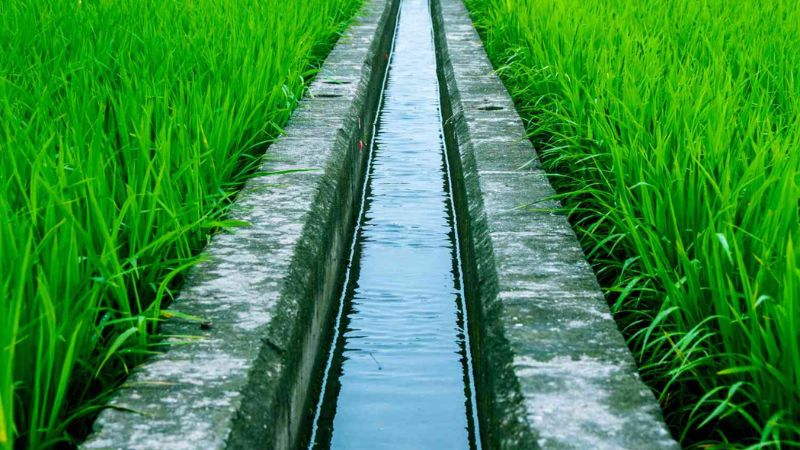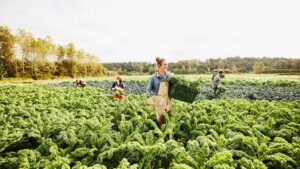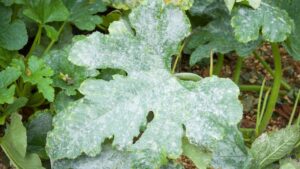Welcome to our guide on sustainable irrigation techniques tailored for organic farms. In today’s agricultural landscape, the need for eco-conscious methods is paramount. With our environment facing unprecedented challenges, adopting sustainable irrigation practices not only ensures the health of your crops but also contributes to the preservation of natural resources. From drip irrigation to rainwater harvesting, we delve into nine effective techniques designed to optimize water usage while minimizing environmental impact. Let’s explore how these methods can revolutionize your farming approach, promoting both productivity and environmental stewardship.
9 Sustainable Irrigation Techniques For Organic Farms
1. Drip Irrigation
Drip irrigation is a precise method of delivering water directly to the root zone of plants, minimizing water wastage and maximizing efficiency. This system consists of tubes or pipes with small emitters that release water slowly and steadily. In organic farming, drip irrigation is highly beneficial as it reduces the risk of water runoff and evaporation, thus conserving water. By providing water directly to the roots, it promotes healthier plant growth and minimizes weed competition. Additionally, drip irrigation systems can be easily customized to suit various crop layouts and terrains, making them versatile for organic farms of all sizes.
Also Read: 7 Organic Soil Amendments To Enhance Your Farm
2. Rainwater Harvesting
Gathering and preserving rainwater for use in irrigation at a later time is known as rainwater harvesting. This sustainable practice helps organic farmers reduce their dependency on external water sources such as groundwater or municipal supplies. By installing rain barrels, cisterns, or reservoirs, farmers can capture rainwater from rooftops or land surfaces and store it for dry periods. Rainwater is free from chemicals and additives, making it ideal for organic farming. Moreover, harvesting rainwater reduces soil erosion and runoff, preserving the integrity of the farm’s ecosystem and promoting long-term sustainability.
3. Mulching
Mulching is a technique where organic materials such as straw, leaves, or compost are spread over the soil surface around plants. This layer of mulch acts as a protective barrier, reducing water evaporation, suppressing weed growth, and regulating soil temperature. Mulching helps retain soil moisture, allowing organic farmers to reduce the frequency of irrigation while maintaining optimal growing conditions for their crops. Additionally, as organic mulches decompose, they enrich the soil with nutrients, promoting soil health and fertility over time.
4. Cover Cropping
Cover cropping involves planting specific crops during fallow periods to cover and protect the soil. These cover crops, such as clover, rye, or vetch, help prevent soil erosion, improve soil structure, and enhance water retention capacity. By covering the soil surface, cover crops reduce evaporation, suppress weed growth, and promote biodiversity. Organic farmers can then incorporate these cover crops into the soil as green manure, enriching it with organic matter and nutrients. Cover cropping is a sustainable irrigation technique that not only conserves water but also contributes to soil health and fertility.
5. Permaculture Swales
Permaculture swales are earthen channels or depressions designed to capture and retain water on sloping landscapes. These swales slow down the movement of water, allowing it to infiltrate into the soil and recharge groundwater reserves. By strategically positioning swales on contour lines, organic farmers can effectively manage water runoff and prevent soil erosion. The retained water provides a consistent moisture source for plants, reducing the need for additional irrigation. Permaculture swales also promote the growth of perennial vegetation, enhancing biodiversity and ecosystem resilience on the farm.
6. Subsurface Irrigation
Subsurface irrigation uses underground pipes or tubes to supply water straight to plant roots. This method reduces water loss through evaporation and surface runoff, making it highly efficient for organic farming. Subsurface irrigation systems can be installed underground, minimizing interference with farming operations and reducing the risk of damage from machinery or weather events. By delivering water directly to the roots, subsurface irrigation promotes deeper root growth and enhances nutrient uptake by plants. This sustainable technique conserves water while ensuring optimal plant health and productivity.
7. Aquaponics
Combining hydroponics (soilless plant cultivation) and aquaculture (fish farming) results in aquaponics, a sustainable agricultural method. Fish waste gives plants in aquaponic systems nutrition, and plants filter and clean the fish’s water. This closed-loop cycle minimizes water usage and eliminates the need for synthetic fertilizers or pesticides, making it ideal for organic farming. Aquaponics systems can be designed to recirculate water continuously, conserving resources and maximizing efficiency. By integrating aquaponics into their operations, organic farmers can produce both fish and vegetables in a symbiotic environment, promoting sustainable food production and resource utilization.
8. Keyline Design
Keyline design is a holistic approach to landscape management that focuses on maximizing water retention and distribution across the farm. By identifying keylines, which are natural contours that dictate water flow, organic farmers can design their landscapes to capture and utilize water more efficiently. Keyline design techniques include creating swales, ponds, and terraces to slow down water movement, prevent erosion, and recharge aquifers. By managing water strategically, farmers can create microclimates that support diverse plant growth and maximize productivity. Keyline design integrates water conservation with landscape management, promoting sustainability and resilience in organic farming systems.
9. Greywater Recycling
Greywater recycling involves treating and reusing household wastewater for irrigation purposes. This sustainable practice helps reduce the strain on freshwater resources and minimizes the environmental impact of wastewater disposal. Greywater from sinks, showers, and washing machines can be treated using filtration and disinfection systems to remove contaminants and pathogens. The treated greywater is then distributed to gardens or fields through drip irrigation or other suitable methods. By recycling greywater on-site, organic farmers can supplement their irrigation needs while reducing water bills and conserving freshwater resources. Greywater recycling is a practical solution for sustainable water management in organic farming.
Also Read: How To Compost Effectively For Organic Gardening – 9 Tips
Conclusion
In conclusion, implementing sustainable irrigation techniques is not just a choice but a necessity for the future of organic farming. By embracing eco-friendly methods like drip irrigation, rainwater harvesting, and other innovative practices, farmers can achieve greater yields while preserving precious water resources and minimizing environmental impact. The nine techniques highlighted in this guide offer a roadmap towards a more resilient and sustainable agricultural future. As stewards of the land, it’s our responsibility to adopt practices that not only sustain our farms but also contribute to the greater health of our planet. Let’s continue to innovate and prioritize sustainability in our farming practices for the well-being of both present and future generations.
FAQs
What is drip irrigation, and how does it benefit organic farming?
Drip irrigation is a method where water is delivered directly to the base of plants through a system of tubes or pipes. It reduces water wastage by targeting the roots precisely, promotes soil moisture retention, and minimizes weed growth, making it ideal for organic farming practices.
How does rainwater harvesting contribute to sustainable agriculture?
Gathering and preserving rainwater for use in irrigation at a later time is known as rainwater harvesting. By harnessing nature’s free resource, organic farmers can reduce reliance on groundwater and surface water, mitigating the strain on local water sources and promoting self-sufficiency in water management.




